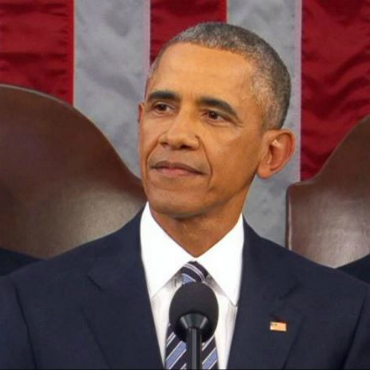State of the Union is light on cyber, but touches on online terror
President Obama's final State of the Union address was light on tech, and was his first in many years not to directly address cybersecurity.

President Obama delivers his final State of the Union address.
In his final State of the Union address, President Barack Obama touched on some of the threats posed by the online activities of terror groups, but did not focus directly on cybersecurity threats.
"Both al Qaeda and now ISIL pose a direct threat to our people, because in today's world, even a handful of terrorists who place no value on human life, including their own, can do a lot of damage," he said. "They use the Internet to poison the minds of individuals inside our country; they undermine our allies.
This was the first State of the Union since 2011 that didn't directly touch on cybersecurity. Previous speeches have praised an executive order on cyber, noted the challenge of combatting cyberattacks and the new demands put on the intelligence community to understand global cyber threats, and in 2015, urged the passage of the cyber bill. The passage of comprehensive information sharing legislation as part of the fiscal year 2016 omnibus spending package may have taken cyber off the table as an urgent issue.
Republicans weren't pleased with the level of attention paid to global terrorism in the speech, whether online or not.
"My concern to this president is the denying of reality," Senate Homeland Security and Governmental Affairs Committee Chairman, Sen. Ron Johnson, (R-Wisc.) told FCW after the speech. "We don't have a strategy of defeating ISIS. He is just downplaying the threat."
While the president delivered his speech the Chairman of the House Homeland Security Committee, Rep. Michael McCaul, (R-Texas.) tweeted responses. He said, "When it comes to the terror threat we face, once again we heard the President offer rhetoric in the clouds while terrorists plot in our city streets."
Obama did include tech as part of one of four big questions he said would face his successor. He asked, "how do we make technology work for us, and not against us -- especially when it comes to solving urgent challenges like climate change?"
He also touted the 1960s space race as an example of what American ingenuity can do when it is unleashed. He also promised to make sure computer science and practical math classes are available to all U.S. students.
Obama also took a shot at the lifetime employment enjoyed by many members of Congress on both sides of the aisle.
"It's not much of a stretch to say that some of the only people in America who are going to work the same job, in the same place, with a health and retirement package, for 30 years, are sitting in this chamber," he said.
NEXT STORY: Indie CIOs fall under FITARA's scope





